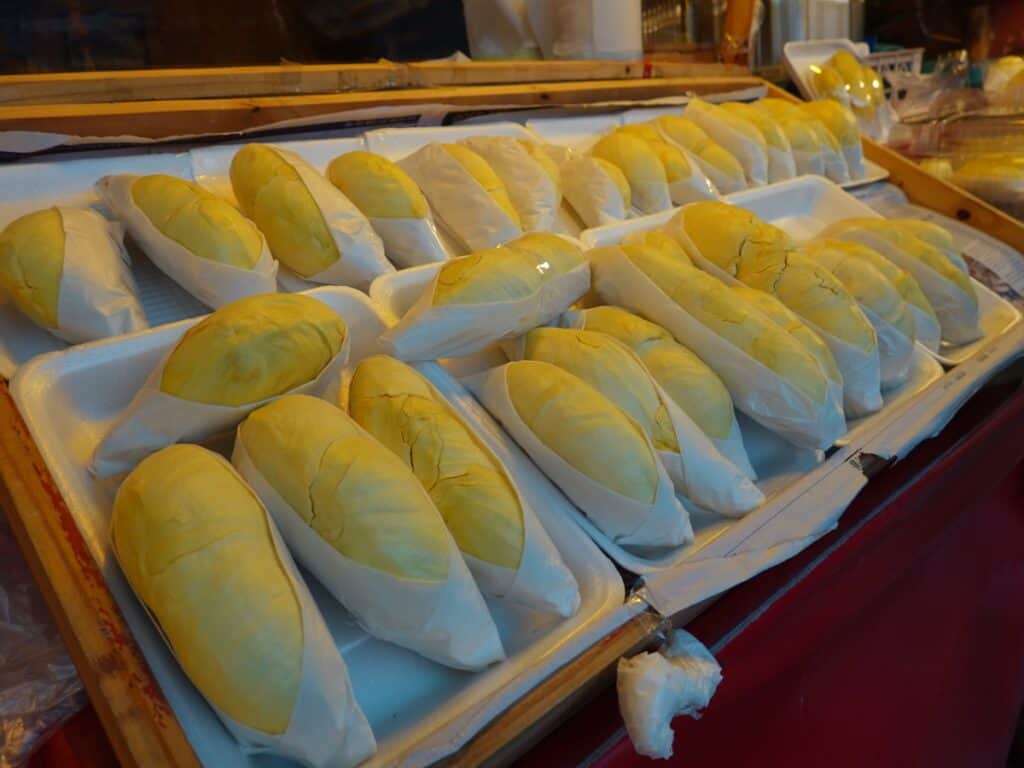Durian is a popular fruit in Southeast Asia, known for its unique smell and creamy texture. However, when it comes to feeding durian to babies, many parents are unsure if it is safe or appropriate. As a language model, I can tell you that babies can eat durian, but there are some things to keep in mind.
According to Solid Starts, durian can be introduced to babies as soon as they are ready to start solids, which is generally around 6 months of age. However, it is important to note that durian has large seeds embedded in the flesh of the fruit that must be removed prior to offering to babies.
While edible if cooked, the seeds are a choking hazard and can be deeply embedded in the flesh. Additionally, durian is high in fiber, which may lead to digestive disorders, flatulence, and constipation if consumed in large quantities. Therefore, it is recommended to offer durian to babies in small amounts and monitor their reaction.

Can Babies Eat Durian?
Durian can be safely introduced to babies over 6 months old. Before that, its strong flavor may be too much for their developing digestive systems. Like any new food, start with small amounts to check for potential allergies, and ensure the fruit is deseeded and cut or pureed into manageable pieces.
Remember, durian is high in sugars, so moderate intake is crucial. Lastly, the distinctive taste might be liked or disliked by your baby. Always consult your healthcare provider before introducing new foods to your baby’s diet.
Durian Nutritional Value
Durian is a rich source of nutrients that can benefit a baby’s growth and development. It is high in fiber, vitamins, and energy-producing carbohydrates. Durian also contains B-vitamins, including folate, which is essential for a baby’s brain and nerve development.
Moreover, durian is a good source of protein and healthy fats, which are crucial for muscle and tissue development. It also contains minerals such as potassium, iron, and zinc that can help support a baby’s immune system.
Durian and Baby’s Health
Durian is generally safe for babies to eat, but it should be introduced in moderation. Eating too much durian can cause constipation due to its high fiber content. It is also important to note that durian has a high sugar content, so it should be consumed in moderation to prevent obesity and other health problems.
Additionally, durian has a creamy texture that can make a baby’s milk creamier and richer. This can be beneficial for breastfeeding mothers as it can help increase milk production.
However, it is important to note that durian has a strong odor that can be overwhelming for some babies. Therefore, it is recommended to introduce durian gradually and in small amounts to prevent choking or digestive disorders.
In conclusion, durian can be a healthy addition to a baby’s diet when introduced in moderation. It provides essential nutrients that can benefit a baby’s growth and development. However, it is important to be mindful of the sugar content and introduce it gradually to prevent any adverse effects on a baby’s health.
When Can Babies Eat Durian?
As a parent, you may be wondering when your baby can start eating durian. Here’s what you need to know about introducing durian to your little one.
Solid Food Introduction
Firstly, it’s important to note that durian should only be introduced as a solid food once your baby is ready to start solids, which is generally around 6 months of age. At this point, your baby’s digestive system is more developed and better able to handle solid foods.
Moderation and Texture
When introducing durian to your baby, it’s important to do so in moderation. While durian is a nutritious fruit, it is also high in sugar and fiber, which can lead to constipation, obesity, and diabetes if consumed in excess.
Additionally, durian has large seeds embedded in the flesh of the fruit that must be removed prior to offering to babies, as they can pose a choking hazard.
When it comes to texture, durian has a soft and creamy texture that may be appealing to babies. However, some babies may find the strong flavor and odor of durian off-putting. It’s best to start with small amounts and see how your baby reacts before offering more.
Durian and Sleep
One common concern among parents is whether eating durian can affect their baby’s sleep. While there is no scientific evidence to suggest that durian has any effect on sleep, some parents have reported that their babies become more active after eating durian.
If you notice that your baby becomes more active after eating durian, it may be best to offer it earlier in the day rather than closer to bedtime.
In summary, durian can be introduced to babies as a solid food once they are ready to start solids, but it should be offered in moderation and with the seeds removed. While durian may not have any direct effects on sleep, some babies may become more active after eating it.
Frequently Asked Questions
What are some good first foods for babies?
When it comes to introducing solids to your baby, it’s important to start with nutrient-dense foods that are easy to digest. Some good first foods for babies include mashed avocado, sweet potato, banana, and pureed carrots. It’s also important to introduce one food at a time to check for any allergic reactions.
Are there any health benefits to durian?
Durian is a good source of vitamin C, potassium, and dietary fiber. It also contains antioxidants that may help protect against chronic diseases. However, it’s important to note that durian is high in calories and sugar, so it should be consumed in moderation.
What are some potential risks of introducing durian to a baby’s diet?
Durian has large seeds that must be removed prior to offering it to babies. The seeds are a choking hazard and can be deeply embedded in the flesh. Additionally, durian has a strong odor and taste that may not be appealing to babies. It’s important to introduce durian in small amounts and watch for any adverse reactions.
Can breastfeeding mothers eat durian?
Breastfeeding mothers can eat durian in moderation. However, it’s important to note that durian has a high sulfur content that can cause gastrointestinal discomfort in some people. If you notice any adverse reactions, it may be best to avoid durian while breastfeeding.
Read more:
